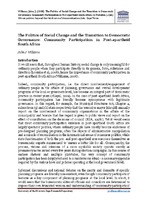| dc.description.abstract | Community participation, i.e. the direct involvement/engagement of ordinary people in the affairs of planning, governance and overall development programs at the local or grassroots level, has become an integral part of democratic practice in recent years (cfJayal, 2001). In the case of post-apartheid South Africa, community participation has literally become synonymous with legitimate governance. In this regard, for example, the Municipal Structures Act, Chapter 4, subsections (g) and (h) state respectively that the 'executive mayor [should] annually report on the involvement of community organisations in the affairs of the municipality' and 'ensure that due regard is given to public views and report on the effect of consultation on the decisions of council' (RSA, 1998c). Yet it would seem that most community participation exercises in post-apartheid South Africa are largely spectator politics, where ordinary people have mostly become endorsees of pre-designed planning programs, often the objects of administrative manipulation and a miracle of reconciliation in the international arena of consensus politics, while state functionaries of both the pre- and post-apartheid eras ensconce themselves as bureaucratic experts summonsed to 'ensure a better life for all'. Consequently, the process, visions and missions of a more equitable society operate merely as promissory notes issued every five years during election campaigns. In this course of endless rhetoric and multiple platitudes, the very concept of community participation has been largely reduced to a cumbersome ritual—a necessary appendix required by the various laws and policies operating at the local government level. | en_US |

